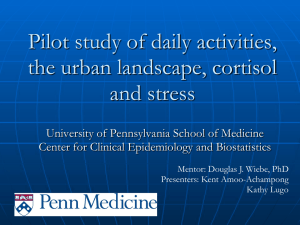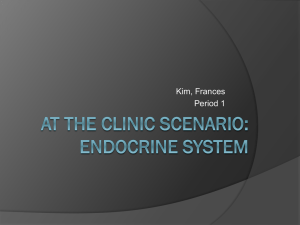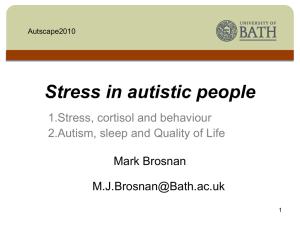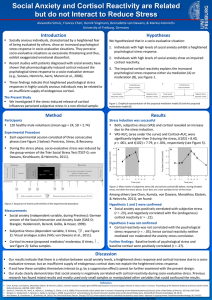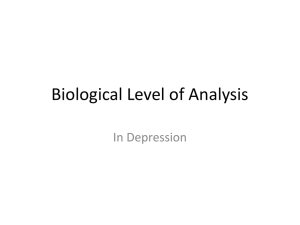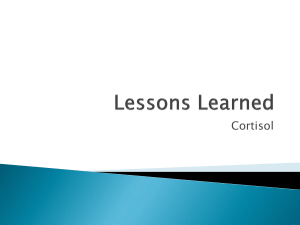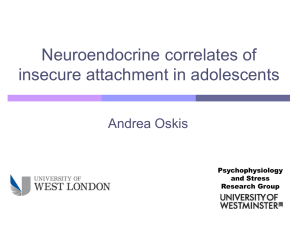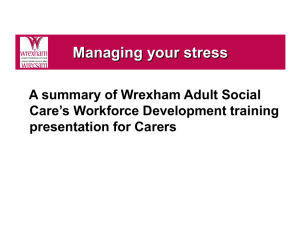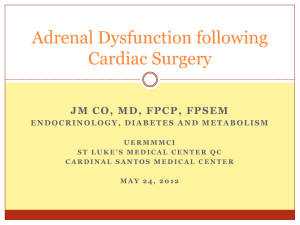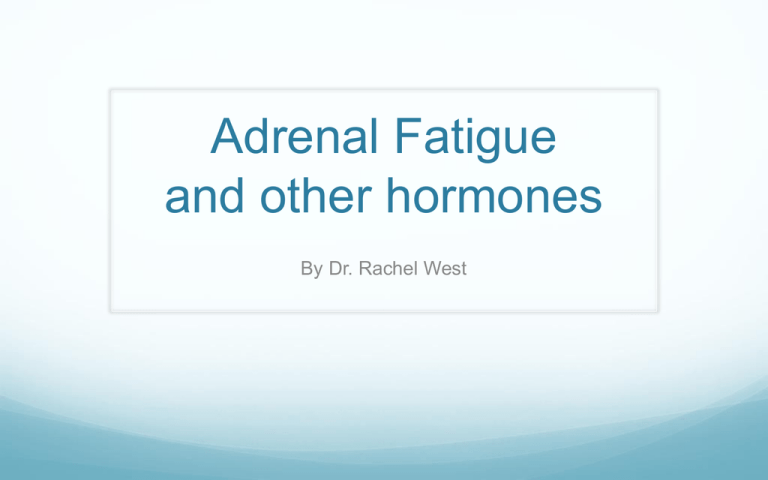
Adrenal Fatigue
and other hormones
By Dr. Rachel West
Dr. West…my child …
Loves sweets or simple
carbs (bread, pasta,
cereal)
Licks salt off foods or his
sweat
Has poor weight gain, or
is too heavy
Has low muscle tone
Has dark circles under
eyes
Has allergies, colitis,
eczema, asthma
Has insomnia, is hyper, is
fatigued
Does not heal from
viruses quickly
Let’s learn about adrenals
These symptoms may be related to adrenal
imbalance!
So many of us have fatigue — ever hear of
Starbucks?! Many of us depend on superficial
forms of energy because our adrenals are
imbalanced.
This imbalance causes many other imbalances
internally.
Adrenals and cortisol
The adrenal glands sit above the
kidneys. The adrenal cortex almost
exclusively produces cortisol
The cortisol levels are highest in the
morning (6 AM - 8 AM) to wake us up,
so sunshine, activity and a bite of food
stimulates cortisone production
Cortisol is lowest in evening to prepare
us for sleep. Growth hormone and
melatonin suppress cortisol at night to
help us sleep
Adrenals and cortisol
Being alive means experiencing the
“stress” of waking every day, which
takes cortisol
It is important to have enough
cortisol to handle the amount of
stress in our life. If you sit in
meditation all day, you need less
cortisol.
Definition clarification
Glucocorticoids = family name for hormones, both natural
and synthetic, that can raise glucose and prevent
hypoglycemia.
Cortisol is the body’s most potent glucocorticoid. It is
endogenous (it is also a mineralocorticoid)
Hydrocortisone is a medication containing exogenous
cortisol.
Cortisone is the natural precursor to cortisol and has
80% of cortisol activity. It is the storage form of cortisol.
A cortisol/cortisone ratio of .7 or higher indicates adrenal
reserve.
Prednisone,
prednisolone,
methylprednisone
dexamethasone and betamethasone are synthetic
derivatives of cortisol to increase its properties
3 properties of cortisol
that keep us alive
Increases blood sugar, thus energy and blood pressure
Neutralizes inflammation (it’s the body’s strongest antiinflammatory), thereby enhancing mood, dynamism, work
capacity, stress resistance; it is anti-rheumatic, anti-pain.
Calms excessive activity of the sympathetic nervous
system that produces adrenaline, the stimulating
neurotransmitter responsible for emotional outbursts
How the adrenals are stimulated in
the body
The hypothalamus in the brain secretes CRH
This stimulates pituitary gland in the brain
The pituitary gland releases ACTH
This stimulates the adrenal glands (above the kidneys)
Adrenal cortex, the outer layer of the adrenals, releases
cortisol
The cortisol affects systemic organs and feeds back to the
hypothalamus to say “slow down”
Stressors of the adrenal
glands – 1 –
Anger/fear/worry/anxiet
y/depression/guilt
Overwork, physical or
mental
Sleep deprivation
Excessive exercise
Light cycle
disruption/late hours
Surgery/accidents/trau
ma/injury
Noise
Inflammation and pain
Stressors of the adrenal
glands – 2 –
Toxic
Mold
exposure/chemical/heavy
Temperature extremes
metals
Malabsorption/maldigestio EMR/radiation/geophysical
n/nutritional deficiencies
Allergies-food and
environmental
General adaptation Syndrome
- How we adapt to stress
-
Alarm reaction
First reaction to stressor= resistance
diminished
-
Resistance stage
Alarm gone and resistance increase as we
adapt to the stress
-
Exhaustion stage
Long exposure wears down body
resistance, adaptation energy gone, alarm
signs reappear, body closes down.
Progression of adrenal fatigue
Stage 1 — cortisol runs high, dhea (in adults) dives
down and pregnenolone normal, so we start to steal
pregenenolone to feed the cortisol pathway.
Stage 2 — cortisol, dhea and pregnenolone are all
lowering (because
pregnenolone)
we
started
stealing
the
Stage 3 — cortisol, dhea and pregnenolone are all low
Stage 1
We get these hormones from the breakdown of our
fats, which, as we know may already be low in cases of
malabsorption.
As our need for cortisol goes high in response to stress
we see: overvoltage, agitation, euphoria, creating
stress and drama
Cortisol too high causes bone loss, low growth
hormones, low muscle strength, loss of calcium in urine
from the bone
Stage 2
So now we have been stressed for some time and are
using up our stores of stress hormones. As cortisol
and pregnenolone lower, it is important to begin to
supplement them, to prevent failure.
Stage 3 and failure
As cortisol and pregnenolone are lowered,
symptoms of low levels are present.
They must be supplemented to correct the
imbalance.
Chronic stress (high cortisol)
response causes
Bone loss
Low insulin sensitivity
Fat accumulation
Low glucose utilization
Protein breakdown
Higher blood sugar
increased
Chronic stress (high cortisol)
response causes
Salt and water retention
(bloated in face)
Low secretory IgA (stool
test)
Inc antigen penetration
Inc IgG circulating
Lower NK cell activity (to
fight viruses)
Low interleuken 2
Low T lymphocytes
Low Cortisol—childhood
symptoms
Thinner narrow face
Thinner narrow body
Ear, nose and throat
infections
Allergies, including skin
rashes, food allergies,
asthma
GI troubles including colitis
and liver
Excessive emotions,
anger/irritability/outbursts
Anorexia, difficulty to make
eat except sweets
Low cortisol - mental and
emotional symptoms
Anxiety in stressful situations
Depression in stressful
situations
Extreme moodiness
Confusion, absentmindedness,
especially in stress
Poor resistance to stress,
experiencing stress as too
much, as unfair
Excessive compassion for
others pain, and sensitivity to
human suffering
Irritability
Low cortisol - mental and
emotional symptoms
Negativism
Victimization
Paranoid, quarrelsome,
accusatory
Excessive emotions,
outbursts of anger/anxiety,
panic attacks
Sharp verbal retorts, strong
dramatized words
Frequent screaming or
yelling
*** Remember - These effects are due to adrenaline, high
catecholamines, low blood sugar and inflammation
Physical complaints
Thin, underweight, difficult to gain weight
Sometimes obesity because of sugar and salt cravings
Hair loss
Headaches with stress
Physical complaints
Skin rashes-eczema, Psoriasis, vitiligo, keloids, brown
spots - tans easily.
Myalgias (muscle cramps), tendonitis, arthritis.
Inflammatory diseases (acute-allergies, conjunctivitis,
otitis, rhinitis, pharyngitis, asthma, food
allergies)(chronic-rheumatic and connective tissue).
Prone to bacterial and viral infections.
Intolerance to meds.
Physical complaints
Excessive sensitivity to pain.
Digestive inflammation-nausea, colitis, bloating, diarrhea.
Hunger attacks, sweet and salty craving.
Decreased appetite, especially for meat.
Difficult to function after emotional outburst, burned out,
empty-headed, distracted, absentminded, daydreaming,
vertigo, fatigue, low energy during stressful situations.
Signs of low cortisol
Thin, but obese if after years of sugar craving
Hair loss
Painful sinuses, hollow cheeks, yellow-brown face, brown spots
(from ACTH)
Rhinitis, otitis, pharyngitis, tonsillitis
Swollen lymph
Bloated abdomen, colitis
Heavy sweating in armpit
Signs of low cortisol
Brown elbow folds and armpits and skin folds in palms
Wet palms and soles
Hypermobile joints, sitting into joints
Low blood pressure
Signs of low cortisol
Nervous and irritable
Painful spleen
Victim and accusatory language
Skin
Melodramatic sharp verbal
negative/aggressive retorts (terrible,
horrible, impossible)
Wheezing, fast heart rate, low blood
pressure, high if stressed
Painful muscles and tendons, joints
inflamed, rheumatoid
rashes including eczema,
psoriasis. Vitiligo, keloids, dark scars,
brown spots in buccal mucosa,
brown skin folds
Patient will crave bites of carbs
throughout the day to boost cortisol
because it is boosted every time we
put food in our mouth (grazer) —
always hungry until levels of cortisol
are sufficient
Tests
1) BLOOD-total cortisol, CBG (transcortin), free cortisol, ACTH
-
Morning, afternoon, evening
-
ACTH stimulation test (1 ug of ACTH injected)
2) URINE 24 hr for cortisol and total corticosteroids, 17-hydroxysteroids
3) SALIVA tests-morn, noon, eve, night
4) DNA genetic testing Ace mutation
Treatments for low cortisol to
raise it
Glandulars—adrenal gland—
cortex – many different
companies make these by
freeze-drying either the whole
gland or just the cortex of cowadrenal glands and put them in
capsules. This was actually
the original steroid before the
pharmaceutical companies
started making it.
Cortisone – Comes as
hydrocortisone, is shorter
acting, usually dosed from 2.5
to 20 mg, 3 to 4 times a day,
depending on needs. Not to be
taken 4 to 6 hours before
bedtime. Some schools of
thought do supplement at
bedtime. Also comes as a
topical creme, which is given
for eczema or allergic
reactions. By taking the
shorter acting, you can take as
needed. But compliance is
more difficult.
Treatments for low cortisol to
raise it
Prednisolone – longer acting
Methylprednisolone – longer acting
Prednisone – longer acting
Treatments for low cortisol to
raise it
Dexamethasone – longest acting.
Pulmicort (budesonide) – inhaled steroid used for inflammation of the lungs
such as in asthma, or severe bronchitis.
Pregnenolone – supplement if low to feed the pathways, especially if memory
problems, available from most companies, can be compounded into a creme.
Typical dosing is 25 to a 100 mg.
Progesterone - if low, especially if anxiety/hyper/insomnia. Available as a
compounded capsule or creme, the pharmaceutical version is called
Prometrium. Make sure to get progesterone in a bio-identical form. Typical
dose is 25 to 400 mg a day.
Treatments for low cortisol to
raise it
Extra minerals throughout the day to help hydrate body and
restore minerals lost in urine from high cortisol - (why kids
lick salt and sweat) dead sea salt baths and sea salt helpful.
Potassium especially helpful founds in coconut water,
bananas, and pecans.
Fix why the adrenals are tired (root cause).
Make sure patient rests-restore and renew.
Alternative treatments
Adaptogens
help move
cortisol
throughout
the
pathways and can help
adrenals.
Ashwaganda
B5-pantothenic acid
Ginseng (be careful: this
gives energy).
Rhodiola
Schizandra berry
Reishi mushrooms
Maca root (be careful: this
gives energy).
Balancing blood sugar in
general: lipoic acid (R-lipoic
is the best), chromium (500
to 1000 mg 2 times a day).
Balance blood sugar
Exercise
Fiber
Phytonutrients
Insulin sensitizing-lipoic acid, chromium, vanadium,
cinnamon
Eat meals
High dose steroid treatment
protocol for Autism
www.aheadwithautism.com is a website where a panel of pediatric
neurologists are promoting the use of higher dose steroids to decrease the
inflammation associated with autism, especially in the brain
Look under the research section for full details.
3 months of high dose steroids biweekly and then 3 months of lowering the
dose for a total of 6 months of treatment. I have treated about 8 patients with
this – and many of them have reported increased socialization, increased
speech, healthier bowels, no eczema, and a calming effect.
3 of the patients have done 2 rounds of treatment, and 1 has done 3 rounds.
One does need to be careful of side effects but I believe this treatment
regimen is a possibility and needs to be studied more.
High dose steroid treatment
protocol for Autism
My recommendation at this point: a trial of Celebrex. Celebrex is
being studied in Autism also as an anti-inflammatory. It is
warranted because the side effects are low.
A 6 months trial of the above protocol may indeed help your child if
done along with a physician’s support.
The dosing that I have used is 75 to 100 mg of Prednisone on
Friday and Saturday for 3 months, then 50 mg x 1 month, then 25
mg x 2 weeks, then 12.5 mg x 2 weeks then 5 mg x 2 weeks, then
2.5 mg x 2 weeks.
Please refer back to the above website for reference.
Lowering cortisol for bedtime or
too high values as in level 1
Melatonin and growth hormone lowers it
Phos serine
Progesterone supports the pathway and is calming for
bedtime
L theanine
Skull cap
Lowering cortisol for bedtime or
too high values as in level 1
Ashwaganda (regulates it)
Pregnenolone (because it is being stolen) – must get blood
levels tested
Dhea (if past puberty) – must get blood levels tested
Calming herbs
Licorice (decreases cortisol and converts to cortisone for
storage)
Other regulators
Sunlight (especially in the morning), small frequent
meals, frequent mineral intake, paleolithic diet, protein
Avoid milk, grains, sugar and sweets, vinegar, caffeine,
alcohol, chronic stress, OCP
Too much
Emotional, agitated, euphoric, insensitive to suffering,
craves and creates stress for others, insomnia, swollen
hands, face and feet, petechiae, high blood pressure,
atrophic skin
Problem solving
Lower dose if agitated versus others
Make sure to have proper protein and anabolic hormone levels(growth hormone, sex hormones in
adults)
Longer acting treatment needed for inconsistent or variable effects with ups and downs
Synthetic derivatives of cortisol have better activity for inflammatory conditions
For vertigo or low blood pressure, you may want to ad aldosterone or fludrocortisone
For acute illness or skin rash, acute asthma, increase dose of cortisone for 1-7 days
For persistent viral/bacterial and yeast infections, make sure to get enough proteins to boost thymus
activity for the immune system
Other hormones
Thyroid
Pregnenolone
Progesterone
Growth hormone
Melatonin
Sex hormones for adults
Thyroid
Labs – TSH, Free T3, Free T4, T3 reuptake, antithyroglobulin antibodies, antiperoxidase antibodies.
If the adrenals are tired, you may develop signs and even
labwork of a slow thyroid. The thyroid is trying to
compensate for what the adrenals are not doing. You will be
more prone to the elevated antibodies when the adrenals
are tired. Some people notice negative effects of thyroid
treatment if they have not first treated their adrenals
(example: heart palpitations).
If you have thyroid problems, get your adrenals checked and
treated.
Thyroid
Signs and Symptoms: poor memory, constipation, dry
skin, fatigue, sometimes compensatory high activity to
avoid the fatigue, flat feet, hair loss, short eye brows,
cold hands and feet, cold in general.
Thyroid
Treatment: depending on Lab results:
-
Natural thyroid - comes as armor or nature’s thyroid. This is a combo of T3 and T4. It is dosed in
grains.
-
Synthetic T4 – most commonly known as Synthroid or Levothyroxine dosed in ug.
-
Synthetic T3, also known as Cytomel.
-
Compounded T4 if preferred.
-
Compounded T3 if needed.
-
Take iodine/iodide, at 12.5 ug a day; eat seaweed. Make sure mineral levels are healthy, such as
selenium. Check for masses on the thyroid and do an ultra-sound if needed.
-
Get orthotics if needed.
Pregnenolone
Pregnenolone is a precursor to Progesterone – many
of my patients come to me with low to no
pregnenolone.
It is great for memory and easy to take.
Available in easy pill or cream, 25 to 100 mg a day.
Blood level should be checked in everyone.
Low pregnenolone
Pregenenolone is indicated for MEMORY
It is the king of all the hormones
It is the first hormone our fat (cholesterol) turns into.
Cholesterol testing on many of the kids has proven to show low
levels.
I have tested many low pregnenolone levels on my kids, and they
are often low
Pregnenolone turns into progesterone which is calming, antianxiety and aids in sleep
Progesterone
Progesterone is a known anti-anxiety, calming, helpful for sleep. Balances
estrogen, testosterone.
It is a precursor to Cortisol and Aldosterone.
It is also available as pill or creme, 20 to 50 mg a day for calming, as needed.
It is bioidentical, it is also available as a synthetic, which I don’t recommend.
It must be gotten from a compounding pharmacy – it is also available as a
yam creme at health stores.
Blood level should be checked in everyone. Saliva levels are not accurate.
(days 3 and 19 through 23 in menstruating women should be checked).
Progesterone
It is NOT a sex hormone. It is a stress hormone.
Although it is famous in the world of women’s health,
kids and men also need it.
As a side-note, for you women out there, it will help
treat and prevent anxiety, endometriosis, fibroids,
fibrocystic breast disease, PMS, and miscarriage (if not
due to chromosomes).
For you dads, it will help you sleep if you need it.
HGH
Human Growth Hormone
Measured by IGF-1, which is made by the liver, and IGFBP3.
If the IGF is low, then a growth hormone stim test with
insulin or arginine is recommended to insure diagnosis.
However if an IGF-1 runs on the lower side of normal, I will
often prescribe growth hormone but it will not be covered by
insurance.
HGH
In pediatrics, an MRI of the brain (pituitary gland) and bone growth
X-Rays are often necessary to rule out obscure causes of the
illness.
For insurance coverage, an endocrinologist is often necessary.
Growth hormone is made at night while we sleep and taking it can
help with calming and sleep. It lowers cortisone, it increases lean
muscle mass, makes the vessels healthier, increases alertness,
helps prevent heart disease, helps with tissue restoration. Some
studies encourage giving it after a stroke or brain damage.
HGH
It will go higher with protein and exercise, and it will be low
with protein deficiency. It does increase longevity. It is not
recommended to be given with active cancer.
Growth hormone comes as tiny little shots and is
approximately $300 a month for the lowest dose. It is also
available as a spray but the efficacy is not as well
documented.
We also carry a product that is a sublingual spray full of
growth hormone precursors, but is not actual growth
hormone.
Sex Hormones and DHEA
Estrogen, Estradiol/Estriol levels should be checked by blood and 24 hour urine hormone in women
with hormonal issues and menopause. Bioidentical replacement therapy as needed.
Testosterone, Free testosterone and DHT should be checked in all men 30 and older. Bioidentical
replacement therapy as needed.
DHEA-sulphate should be checked by blood in everyone post-puberty and supplemented as
appropriate.
5 to 20 mg in women, and 20 to 50 in men.
In a 24 hour urine hormone test, the need for DIM (cancer prevention) and methylation support
(related to hormones), and hormone ratios can be more accurately determined. Also, issues such as
high DHT or aromatization of testosterone need to also be addressed.
This is just a quick overview.
Rest and Relaxation
I’m not kidding!
Take your kids outside, give them massages with oil, play relaxing music, use lavender
oil, do gentle stretches with them, especially stretching their back.
Become more relaxed yourself, they feed off your stress
Remember these kids are in a million therapies, working harder than the rest of us for
simple tasks, and they are depleted. They need downtime.
Especially if you just started down this road, you may be passionate about potential
treatment options. But take your time, make sure to continue to enjoy life, do not ruin
your marriage, still pay attention to your husband/wife and have fun with your child.
This is a difficult diagnosis, and this is a long and hard journey.
Rest and Relaxation
Everyone in the world has stress – it’s how you deal with it that matters.
Don’t do too much, be on time – being late causes an unhealthy adrenaline rush.
Be like a spiritual warrior, take deep breaths from the bottom of your belly and up through
your heart throughout the day yourself, encourage your kids to do the same.
Stay as present as you can in the moment, so that you and your children can still
experience this thing called life.
Rest and Relaxation
Try to stop worrying, try to pray more, find acceptance, try
and see some of the beauty, let go of your anger once
you’ve processed it and use all of that energy towards
getting your child better.
Give 10% back to the community or other mothers and more
if your child gets cured!
You will meet many heroes and healers - don’t focus on their
imperfections.
You and your child will become more soulful because of this
challenge ahead of you and your family.

